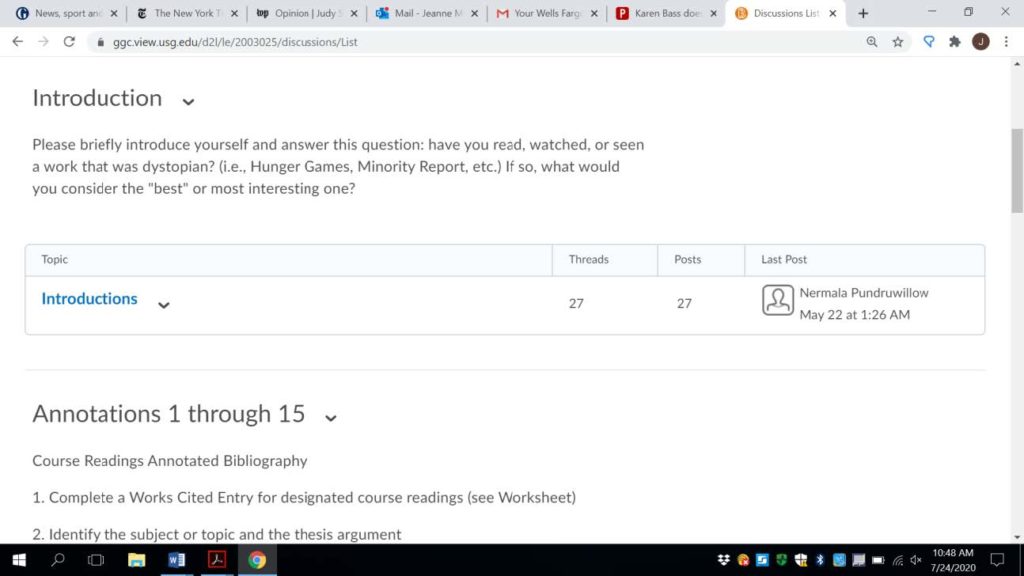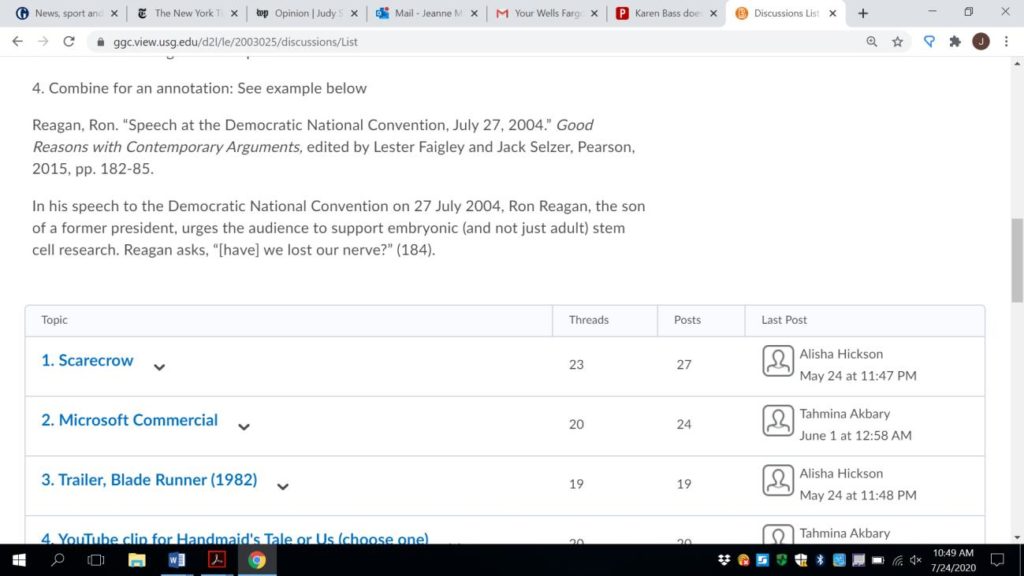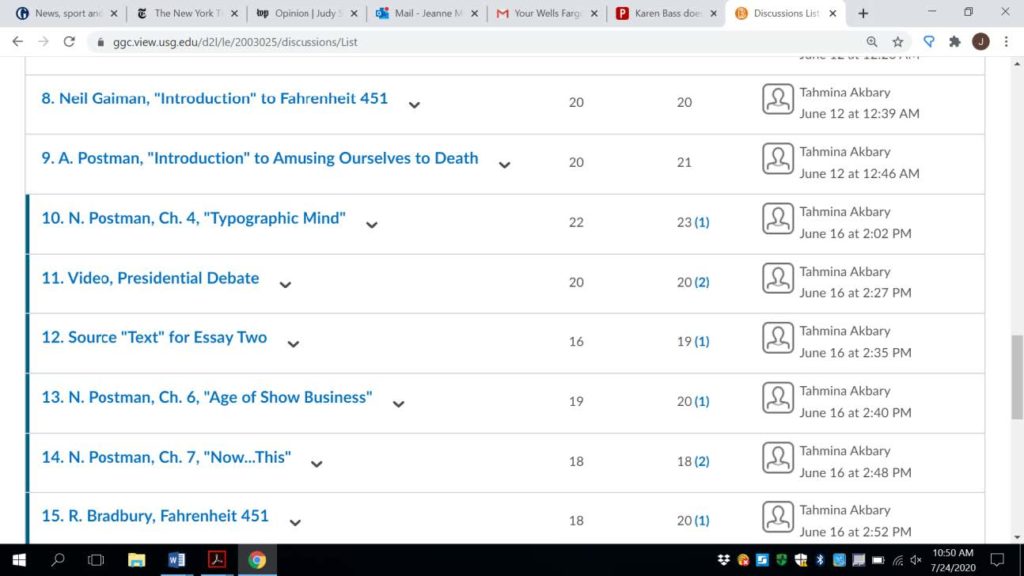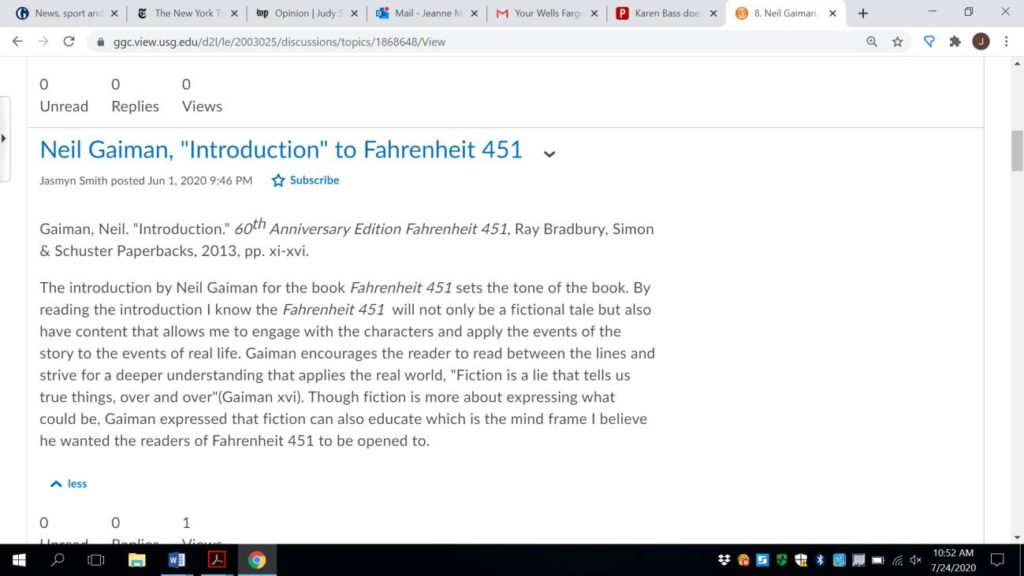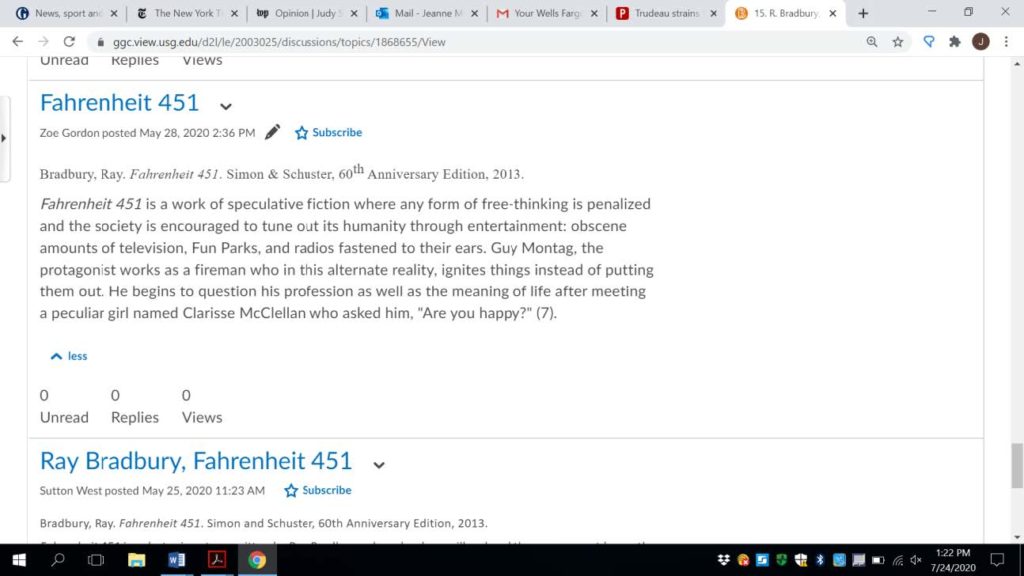July 25, 2020:
In my English 1102 courses, which build on various examples of dystopian works or concepts towards a research project, I use Discussions as a forum for a pass/fail assignment (attached). Students contribute short entries on course material fifteen or seventeen times throughout the semester to the Discussion forum.
Problems: The contributions are not unsolicited expressions of engagement, if that would be a preference. The grading is a bit tedious as it requires me to enter the “pass” for each student into the gradebook seventeen times or as they submit. Students pass simply by submitting. Occasionally, a student has plagiarized another’s entry. Students who wish to avoid reading can “pass” this portion of the class with a little bit of clever editing.
A few observations: If necessary, I will offer edits privately (via the gradebook). All of the student submissions to Discussions are available to all students to review: I try to choose one or two to recommend or to “edit” punctuation or citation errors or problems as we go along.
As a side note, I used to try to publicly edit ALL of the early submissions, but students either did not read or attend to the edits or, worse, the remarks stymied their willingness to take chances.
The assignment is highly structured in the sense that students can simply copy much of the required information to complete the assignment: I supplement the provided models with discussions of the logic behind MLA and academic conventions and quoting, but I am assuming that students will also learn by modeling their entries on the ones I provide. They need to vary the content, that is, the phrasing and quotes in the provided models. Before each is due, we will have discussed the readings or videos. I will have identified several quotes in the course of the discussion which they can consider applying here.
The assignment is designed to develop student confidence with academic conventions and specifically MLA guidelines for recognizing genres of material, generating works cited entries, citing sources, properly introducing and punctuating quotations, making use of annotated bibliographies in preparation for writing essays and for the final research project. In terms of content, it emphasizes the importance of identifying and fairly summarizing another’s argument.
“A” students have no difficulty with the assignment and post in the forum early. “B” students tend to review, and learn from, other’s posts most often and make progress with each entry. Some students struggle with the concept and deadlines. Many students thus delay posting their entries until they begin to see the benefit when we turn to the essays. I allow them to post them after the supposed deadlines, even until the final weeks, though I do not tell them that in advance.
Benefits: This assignment allows me to avoid quizzing students on readings. It allows me to begin teaching basic research skills using low stakes writing from the first week of the semester. It aims to help students keep up with the readings and the material they will need to write their essays. The entries will be repurposed in the assigned essays, which ask them to analyze and/or apply a specific reading or video and are graded. This assignment familiarizes students with MLA / academic conventions and the need to edit, making it easier (that is a relative term) to focus my teaching of the research paper on argument or materials. The quality of the entries do vary and could be graded if one wished.
Results: I have found that students can master summarizing through this exercise and its brevity helps me identify early issues in reading and writing, quoting or citation, as well as basic grammar and punctuation confusions. Progress or reinforcement rather than perfection is the goal in this low stakes assignment.
Limitations: I have not been able to get students to interact with each other on the forum. Very few actually read each other’s posts, which would actually be pretty helpful to them; only some ask to resubmit them. Although “Part Two” of the assignment allows them to revise, not all students do.
Set Up: See screenshots at the end of the document. I create a preliminary Forum and “topic” prior to assigning this task to introduce students to the forum (Screenshot 1). In this Discussions forum and topic called “Introductions,” I ask them to introduce themselves in one or two sentences (with a specific prompt about dystopias) to allow them to get familiar with the technology and the location of the link on the course web site. I then create a separate Forum for the annotations and create “topics” for each of the 17 entries (See screenshot 2). I give the students the assignment on the second day of class. I begin with short video commercials or clips since they are easier for them to view and summarize before asking them to process increasingly more complex texts. (See Screen Captures below)
Description:
Students are asked to generate fairly formulaic two sentences for specific course readings and videos throughout the first eight weeks of the semester.
Requirements: Part One. Two-Sentence individual annotations (“entries) to be submitted to Discussions; all will be graded pass/fail (full credit granted for submissions).
Part Two. In Week Twelve, all of the submissions will be collected, rearranged and put in alphabetical order, and submitted as a single document called “Course Readings Annotated Bibliography” to Assignments Dropbox. This will be graded with a letter grade.
Due: Part ONE. Week One (Annotation Entries 1-4, due by Sunday, Aug. 13); Week Two (Entries 5-6, due by Sunday, Aug. 23), Week Four (Entries 7-9, due by Friday, Sep. 4); Week Five (Entries 10-15, due by Friday, Sep. 11); Week Seven (Entry 16, due by Wednesday, Sep. 23); Week Eight (Entry 17, due by Wednesday, Sep. 30).
Part TWO. Week Twelve (all 17 entries reformatted in a single document called “Course Annotated Bibliography” and submitted to the Assignments Dropbox.
Instructions:
1) As you go along, create and update a WORD document called “Course Readings Annotated Bibliography.”
2) Begin with a Works Cited entry for EACH OF the 17 designated course readings. You may create your own or COPY it from the list below. (*See the list of works cited entries and ‘SAMPLE’ Annotated Bibliography BELOW and Rules for Writers, pp. 470-71).
3) Then, provide a two-sentence description of the source.
4) In the first sentence of the “annotation” or note, introduce the source, identifying the genre (speech, essay, blog, book chapter, etc.) and author and summing up or describing the subject or topic of the selection and the thesis argument (use the author’s full name on the first mention; use only the last name thereafter).
5) In a separate sentence, add an interesting or useful quote; use a signal phrase (speaker plus a verb) and page citation (in parentheses) if available; if not, use (n.p.) to indicate “no page numbers in this source.”
6) Go to the course website. Find and click on the “Discussions” tab in the horizontal menu. Go to the Forum called Course Readings Annotations. Copy and submit the entry you created to the proper Discussions “Topic” as a separate “thread.” Title your thread by your name.
*Each annotation should be at least two sentences. They will look like this example:
TouchGamePlay. “Chipotle Scarecrow-Universal-HD (Sneak Peak) Gameplay Trailer.” YouTube, 11 Sep. 2013, https://youtu.be/Dl-6C1elTl8. Accessed 24 July 2020.
The Chipotle advertisement packaged as an animated short film argues that ultra-processed food is unnatural, industrialized, and deceiving. Chipotle differentiates their own brand from other chains and encourages the viewer or consumer to “Cultivate a better world” by choosing their fresh, non-processed food (n.p.).
This is what the page and response rate looks like:
